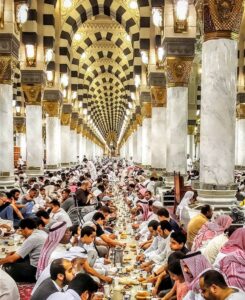Written by Isaac Rahman, Principal Product Manager
For Muslims like myself around the world, this week marks the start of Ramadan. Today I want to share a little about what Ramadan is, its significance in Islam and some (hopefully) interesting facts!
What is Ramadan?
Ramadan is the 9th month in the Islamic Calendar and holds special significance for Muslims. It was during Ramadan that the Quran, Islam’s holy scripture, was first revealed to the prophet Muhammad. But that’s not all: Muslim scholars hold that all holy scriptures were first revealed during the month of Ramadan – that includes the Torah and Bible too. It’s no wonder then that Ramadan is an important month!
Throughout the month, it’s obligatory for all capable Muslims to fast from sunrise to sunset. In fact, fasting during Ramadan is one of the 5 pillars of Islam – the most fundamental practices that define what it means to be a Muslim.
I specifically say ‘capable’ above as the Quran allows exceptions for those who are ill, elderly or otherwise would be damaging their health by fasting
Whilst fasting, Muslims refrain from eating or drinking anything – that also includes water! But Ramadan is about more than just giving up food and drinks, it’s intended to be a month of reflection, community, and increased spirituality. Let’s dive into these a little more.
Iftar & Ramadan Festivities & Benefits
As well as being able to finally eat after a long day, Muslims are encouraged to break their fast communally during iftar, the evening meal. Whilst there are no strict rules, Ramadan is a time to gather and presents us with opportunities to strengthen our bonds with family and neighbours.
My family and I have personally been blessed enough to visit Mecca, Islam’s holiest city, on numerous occasions. There, every single day of Ramadan, thousands of Muslims gather to break their fast together at iftar. Rows of prayer mats are lined with food and strangers from across the world breaking bread side by side. Everyone eats the same meal, and everything is provided free of charge by the mosque. It doesn’t matter whether you’re old or young, rich or poor, where you’re from, what colour your skin is or what your job is – everyone is there to celebrate as one and that, I think, is beautiful.

Whilst Ramadan is commonly known as a time to give up food and drink, this is only the start. Muslims are also encouraged to “fast” in other ways by, for example, refraining from lying, gossiping, backbiting (although I hope we’re all trying not to do these anyway!) and reducing mass media consumption. Instead, we’re encouraged to spend time praying and reciting the Quran. The idea is we avoid spending the entire day scrolling through social media and instead focus on our own spirituality. In doing so, Ramadan presents us with an opportunity to “reset” and break any bad habits towards not only becoming a better Muslim but a better person in general. I can personally say Ramadan went a long way during COVID to help reduce my TikTok hours!
It’s also worth briefly mentioning that simply the act of fasting itself has been shown to provide numerous health benefits: improved blood pressure, better cholesterol levels, boosting metabolism and more!
We see then that Ramadan provides a whole host of benefits for those practising: mental resets and discipline for the mind, health benefits for the body, and an opportunity for building relationships with both our communities and Allah (God) for the soul.
Zakat (“zuck-aht”)
Earlier I mentioned that Ramadan is one of the 5 pillars of Islam – another pillar that’s particularly important during this month is zakat. Islam requires that all Muslims donate a portion of their wealth to charity. As we saw earlier, being a pillar means this is non-negotiable – giving to charity is part of the essence of what it means to be Muslim.
Whilst zakat can be paid at any time during the year, it’s traditionally paid during the month of Ramadan given the natural alignment with being selfless, encouraging a sense of community etc. There’s a lot of guidance and discussion on zakat so I won’t go into it here but here are some of the key facts:
- Zakat is set at 2.5% of one’s wealth – this is the same for everyone
- Zakat is paid on wealth not earnings i.e. you would pay 2.5% of your savings, not your salary
- One’s wealth must pass a certain threshold before zakat is required – for those who are below the threshold, giving zakat is not necessary. This is to ensure that paying zakat would not negatively impact your ability to otherwise save, pay for living essentials etc
To expand on what we said earlier then, Ramadan also presents us with an opportunity to give back and help those in need.
Eid (“eed”)
After a month of fasting and reflection, Ramadan ends with Eid al-Fitr which translates to “Festival of Breaking Fast” or, as it’s known in our house, “the day we can finally eat breakfast again.” Eid is a day for celebrations not least of all because we can eat again! Across the world, Muslims celebrate with their varying traditions ranging from painting eggs to eating lots of sugary treats.
In my family, we start the day by heading to the mosque for a special Eid prayer – much like we did during Ramadan, this gives us the chance to celebrate with our neighbours. I’m lucky enough to have lots of extended family in London so each Eid, we pick one designated house to gather in. After prayers, we all head there for food, party games and my favourite activity, Secret Santa Sheikh (a Sheikh is an Islamic leader or elder).
Fun fact: Islam is based on a lunar calendar and has a shorter year compared to our traditional Western, sun-based Gregorian calendar. This means Ramadan (and by extension, Eid) moves up 10 days every year. For example, this year Ramadan will start on 10th/11th March, next year it will start on 1st/2nd March, the following year 17th/18th February etc. That means in the year 2033, Eid will be on the same day as Christmas!
How you can support your colleagues practising Ramadan:
- If you are a people leader, be considerate about short notice leave requests and make room for flexible working hours.
- Be considerate when it comes to planning team socials to be inclusive. Appreciate that not everyone will be able to attend socials during Ramadan as Iftar (breaking the fast) is family time.
- Be considerate to those fasting by refraining from eating during video calls with your colleagues observing Ramadan.
Ramadan Mubarak to those celebrating this month and thank you all for taking the time to read.











